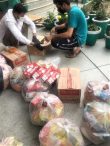Pakistan was locked down starting 22 March 2020 until 10 May 2020, with a stoppage of airlines, trains, and public and private transport apart from closing down businesses as well as schools. Seventy percent of domestic and international flight operations were banned. International flights were only allowed in Lahore, Islamabad, Karachi, and Peshawar. During the lockdown, only food and medicine shops were allowed to open. The government advised the public to avoid mass gatherings and to practice social distancing. The government also announced a relief package for the agriculture sector.
At the early onset of the spread of COVID-19, the government reported that there are not enough test kits and facilities making it impossible to test at a large scale. As of 28 June 2020, 195,589 have been diagnosed with COVID-19 in Pakistan.
The spread of COVID-19 has badly affected the peasantry in Pakistan. The lockdown has a devastating effect on daily wage earners, landless peasantry, and small farmers in particular.
The prices of most vegetables and fruits as well as poultry have lowered because there was no access to markets. It has reduced the hiring power of small farmers for vegetation and access to the market. The uncertainty has forced most Pakistanis to buy the most necessary items only.
To mitigate the effects of the pandemic on farmers’ organizations in the country, the Crofter Foundation, the national implementing agency of APFP in Pakistan, conducted several activities. First, the organization conducted an online awareness campaign for farmers on how they can stay safe during this pandemic. The organization is continuously coordinating with FOs to get information if any member needs support about health facilities or medical emergencies. Due to the lockdown, all farmers’ organizations can only be contacted via phone or the internet.
The NIA in Pakistan also raised funds to purchase food packs for distribution to the needy families. In collaboration with Pakistan Kissan Rabita Committee and other organizations, NIA Pakistan provided basic food items to farmworkers, daily wagers, and other marginalized communities in Pakistan. These food packets contain wheat flour, rice, cooking oil, spices, dry milk, sugar, pulses, soap, washing powder, etc. to help them get through the difficulties because of the lockdown.
The farmers who are growing flowers experienced loss of income because all functions have been canceled and hotels and restaurants have closed thus they could not sell their products to the market. To help these farmers, NIA Pakistan connected them with the government relief fund.
Crofter Foundation also facilitated transportation for farmers who could not take their products to the market because of a lack of available transportation.
Moreover, the organization also made a request to the authorities to allow shops and workshops related to selling, purchase, and repair of agriculture to open because it was wheat harvesting season when the lockdown was implemented and farmers cannot harvest their crops without the availability of agriculture machinery.
In addition, NIA Pakistan also developed a leaflet about the COVID-19 pandemic which includes information on how the government can respond to the public and how the public can find a better way to fight the pandemic. The leaflet is available in English and Urdu and was available online, but the Urdu version was also printed out for distribution.
The government announced to pay compensation to over 9 million unemployed, low income, and daily wage earners Rupees 3000 (USD 18) monthly, however, there was no mention of the landless peasantry and small farmers if they also fall in this category. #




Comments are closed